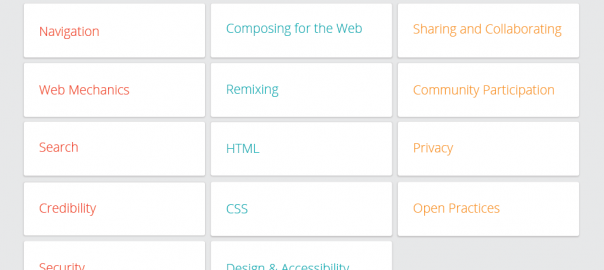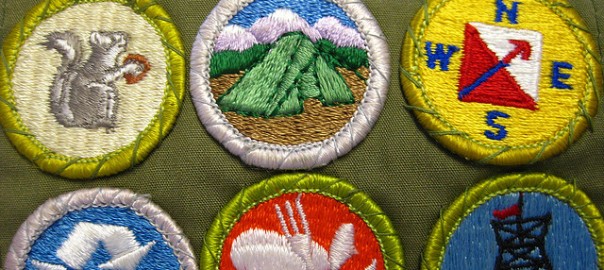I’m writing this from Amsterdam Schipol airport, where my flight’s delayed. Although frustrated at the delay, I’m excited to be heading to a workweek with my colleagues on the Open Badges team. It’s a week we’ve affectionately named Badge Camp where we’ll be hanging out, discussing, planning, playing the occasional game and doing some yoga in Maine, USA.
Chris McAvoy suggested that we write blog posts before we meet as position statements to ensure “great conversations instead of religious battles”. It’s a great idea.
There’s three things I want to get out of this week:
1. Team building & communication
We’ve grown quickly as a team and get on well, moving quickly and efficiently despite timezone differences. However, there’s always room to improve: the better you know people the easier it is dealing with them on a day-to-day basis. It’s the difference, I suppose, between working in an office where you can walk or lean over to ask someone a question, versus having to schedule a meeting or pinging them on IRC. Working face-to-face has its advantages.
Also, and it might just be me that feels this, but we use a plethora of tools in our daily internal communications. Some of these are standard across Mozilla while some are peculiar to our team. I want to get a sense of what we’re using, why we’re using it, and if there’s anything out there that could do the job better. Being out of the loop can feel disempowering, even if it’s accidental, when you’re working by yourself in a different timezone to others.
2. Giving people the tools they need
The Open Badges Infrastructure (OBI) is a platform for innovation. As such, if we provide everything for people then it could potentially stifle innovation. We’ve held off launching a Mozilla-provided badge issuing platform, for example, so we could see the approach that others provided. However, my experience evangelising badges over the last year proves to me that people need something they can trust that’s Mozilla-backed. I feel strongly that we need to pivot the badge maker we made for Chicago Summer of Learning into a more general issuing platform.
I’m also excited by suggestions I’ve seen from my colleagues about a more developed badges dashboard within the backpack featuring discoverability and suggestions. This week I’m definitely looking forward to having more conversations about that. Also, ‘tools’ can also include things like case studies, good practices and the kind of things people need when they’re writing proposals. We should make it easier to find those things and, if they don’t exist, make sure they’re created.
3. Badging alignment with standards
To my mind, the OBI is a fantastic way to align with standards. I have a vested interest in this, of course, as I spend half of my time working on Mozilla’s Web Literacy Standard.
To be more specific:
- I think we should re-visit Erin’s Badge Validation paper
- Linked to the second point above, I think we need to include the ‘alignment’ metadata field in any more general badge issuing tool we provide
- We need to do some evangelism/advocacy with standards bodies help them move to OBI-compliant systems
Conclusion
We’ve spent a couple of years moving from idea to execution and now have v1.0 of a technical standard that’s beginning to change the learning landscape. We’ve moved from people asking what? to why? to how? What we need to do next, I feel, is to keep innovating on the technical side of things, but to double-down on the where.
I think we should be showcasing people’s Open Badges success stories and pointing others towards well thought-out collections of resources to help them with their journey. Once an organisation has decided integrating with the OBI is a good idea we should make the process from decision to badge system as straightforward as possible.
Image CC BY-NC-SA rocket ship
Some of the team have also posted their thoughts:




